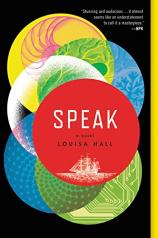Speak
Review
Speak
Language helps express culture. But does linguistic communication, written or spoken, define humanity? And what is the role of memory? In her inventive speculative novel, SPEAK, which is about companionship, intelligence, memory and what it means to be human, Louisa Hall explores the relationship between communication and human culture as eventually complicated by artificial intelligence. It follows six characters living in various times and places, whose connections are not at first apparent but whose stories are intertwined and interdependent in powerful ways.
Though SPEAK is not told chronologically, it all begins with the diary of Mary Bradford, a 13-year-old English girl setting out for America with her parents and the man she was just made to marry. With only her diary and beloved dog Ralph, Mary does her best to see the ocean voyage as a great adventure but is heartbroken by her arranged marriage, and afraid of the crossing and the world she will find at the end of it. Her riveting diary is later found in some library archives by Ruth Dettman, a Jewish scholar who survived the Holocaust though lost her home and entire family. Ruth's edition of Mary's journals form the basis for some of her husband Karl's work on artificial intelligence, giving his program, MARY, a voice and the beginnings of a memory. But the Dettmans disagree with the amount of autonomy the program should have, and this becomes a symbol for the dissolution of their marriage, remembered in a series of emotionally raw letters between them.
"At once a thoughtful meditation on the human condition and a chilling vision of a possible future, SPEAK is a dark, smart, complicated and challenging novel with an inventive and sometimes disconcerting style."
Karl Dettman's work was built upon that of Alan Turing, fictionalized by Hall in another series of letters, these between Turing and the mother of his deceased friend. In them, Turing shares his feelings as well as the work he is doing with computer programming and his dreams of growing artificial organisms that mimic the human brain.
Sitting in a Texas prison in the 2040s, Stephen R. Chinn is also mourning the loss of a marriage and examining his work with robots. Chinn was the creator of the babybots, dolls that came to take the place of human relationships for a generation of American girls living in a devastated environmental landscape. His work is also based upon the MARY algorithms, and the babybots are eventually declared illegal and confiscated after a strange illness is connected to them.
Hall also gives us the conversation (entered as evidence in Chinn's trial) between a teenager named Gaby White and MARY3, a robot with whom she is communicating after her babybot is taken and she is quarantined. Gaby shares what life was like for her both while she had her babybot and since it was taken. Her vision of the future is dismal and lonely. The final voice, given to readers sparingly, is that of a babybot, on a truck and then in a disposal facility in the middle of a desert. Her memory, stretching from Mary Bradford on, is in danger of being lost as her battery drains, never to be recharged.
Amazingly, Hall tells each of these stories with distinct voices and styles, and yet weaves them together to compose a vision of a culture wherein speech, language, communication and connection are in constant flux even as the needs of humanity stay essentially unchanged. At once a thoughtful meditation on the human condition and a chilling vision of a possible future, SPEAK is a dark, smart, complicated and challenging novel with an inventive and sometimes disconcerting style. It asks big questions and provides few answers, instead asking readers to examine beliefs about technology and memory, machines and people, programs and senses.
Reviewed by Sarah Rachel Egelman on July 10, 2015
Speak
- Publication Date: May 3, 2016
- Genres: Fiction
- Paperback: 336 pages
- Publisher: Ecco
- ISBN-10: 0062391208
- ISBN-13: 9780062391209





